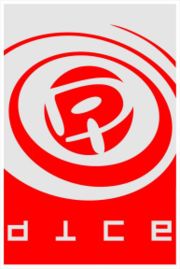Dice
- Dice
-
Digital Illusions CE
Digital Illusions Creative Entertainment (DICE), est une entreprise suédoise spécialisée dans le développement de jeux vidéo. Elle emploie début 2006 environ 200 personnes et est basée à Stockholm.
Elle a été fondée en 1992 par Andreas Axelsson, Olof Gustafsson et Fredrik Liliegren[1]. Elle développe tout d'abord des jeux de flipper tels que Pinball Dreams, Pinball Fantasies ou Pinball Illusions. En 1996, le groupe Bonnier investit dans DICE, avant que la société ne soit cotée au nouveau marché à la bourse de Stockholm en 1998. En 2003, Electronic Arts devient l'actionnaire de référence avec 19% des parts. Suite à une offre publique d'achat lancée en 2004, le groupe américain détient fin 2005 près de 68% des parts. Début 2006 est annoncée la fusion entre les deux groupes.
Le principal succès de DICE est la série des Battlefield, débutée en 2002 avec Battlefield 1942.
En 2008, DICE crée un nouveau genre de jeu, avec Mirror's Edge.
Liens externes
Sources
 Portail des entreprises
Portail des entreprises Portail du jeu vidéo
Portail du jeu vidéo
Catégories : Entreprise suédoise de jeu vidéo | Entreprise fondée en 1992
Wikimedia Foundation.
2010.
Contenu soumis à la licence CC-BY-SA. Source : Article Dice de Wikipédia en français (auteurs)
Regardez d'autres dictionnaires:
DICE — steht für: Liar Dice, Würfelpoker Poker Dice Würfelpoker Dice Stacking Geschicklichkeitsspiel, Mini Dice Glücksspiel Dragon Dice Sammelwürfelspiel Uno Dice, Kartenspiel Fuzzy Dice Nachbildungen von Spielwürfeln Digital Illusions CE, schwedisches… … Deutsch Wikipedia
Dice — steht für: Liar Dice, Würfelpoker Poker Dice Würfelpoker Dice Stacking Geschicklichkeitsspiel, Mini Dice Glücksspiel Dragon Dice Sammelwürfelspiel Uno Dice, Kartenspiel Fuzzy Dice Nachbildungen von Spielwürfeln Loco Dice DJ und Produzent der… … Deutsch Wikipedia
Dice — Saltar a navegación, búsqueda Para otros usos de este término, véase Dice (desambiguación). Dice, Dicea o Diké (en griego antiguo Δίκη Díkê, ‘justicia’) es, en la mitología griega, la personificación de la justicia. Según Hesíodo era hija de Zeus … Wikipedia Español
dice — ► NOUN (pl. same; sing. also die) ▪ a small cube with faces bearing from one to six spots, used in games of chance. See also DIE(Cf. ↑die). ► VERB ▪ cut (food) into small cubes. ● dice with death Cf. ↑dice with death … English terms dictionary
dice — dice; prej·u·dice·less; war·ran·dice; jaun·dice; prej·u·dice; cad·dice; … English syllables
dice — [dīs] pl.n. sing. die or dice [ME dis, pl.: see DIE2] 1. small cubes of bone, plastic, etc. marked on each side with a different number of spots (from one to six) and used, usually in pairs, in games of chance 2. [with sing. v.] a gambling game… … English World dictionary
Dice — (d[imac]s), n.; pl. of {Die}. Small cubes used in gaming or in determining by chance; also, the game played with dice. See {Die}, n. [1913 Webster] {Dice coal}, a kind of coal easily splitting into cubical fragments. Brande & C. [1913 Webster] … The Collaborative International Dictionary of English
Dice — (d[imac]s), v. i. [imp. & p. p. {Diced} (d[imac]st); p. pr. & vb. n. {Dicing}.] To play games with dice. [1913 Webster] I . . . diced not above seven times a week. Shak. [1913 Webster] … The Collaborative International Dictionary of English
Dice — (d[imac]s), v. t. [imp. & p. p. {Diced} (d[imac]st); p. pr. & vb. n. {Dicing}.] 1. (Cooking) To cut into small cubes; as, to slice and dice carrots. [PJC] 2. To ornament with squares, diamonds, or cubes. [1913 Webster] … The Collaborative International Dictionary of English
dice — early 14c., des, dys, plural of dy (see DIE (Cf. die) (n.)), altered 14c. to dyse, dyce, and 15c. to dice. As in pence, the plural s retains its original breath sound, probably because these words were not felt as ordinary plurals, but as… … Etymology dictionary
dice — is in origin the plural of die (as in the die is cast, meaning ‘the decisive step has been taken’). Dice are also the small cubes bearing 1 to 6 spots on each face, used in games of chance; this form is also used for the singular (He had a dice… … Modern English usage

 Suède
Suède

